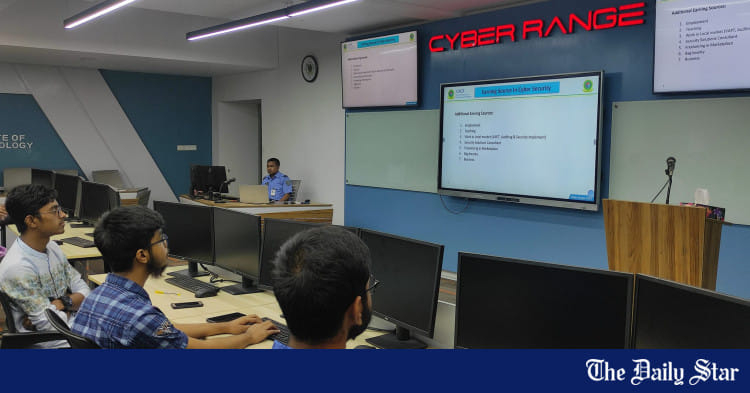Saif
Senior Member
- Joined
- Jan 24, 2024
- Messages
- 17,239
- Likes
- 8,332
- Nation

- Residence

- Axis Group


The need for cybersecurity education in Bangladeshi universities
Institutions must equip students with skills to steer through the cyber world's complexities.
The need for cybersecurity education in Bangladeshi universities

Inside MIST's Cyber Range.Photos: Javed / MIST Cyber Security Club
It's 2024 and in this digital age, cyber awareness should start from one's educational institution. Here, universities play a major role. These institutions must equip students with skills to steer through the cyber world's complexities.
However, a significant challenge is the lack of real-time exposure to cyber threats. The Military Institute of Science and Technology (MIST) addresses this with the "Cyber Range", a cutting-edge cybersecurity training facility, one of the first of its kind in Bangladesh. This facility, under the Center for Advanced Computing and Research (CACR), simulates attack scenarios, fostering hands-on experience critical for effective cybersecurity training.
One compelling reason for integrating cybersecurity education into the academic curriculum is the growing concern of cybercriminals targeting educational institutions. Universities store a vast amount of sensitive data, including student records, research findings, and intellectual property. Without adequate cybersecurity measures, these institutions become prime targets for malicious actors seeking to exploit vulnerabilities for financial gain or to compromise valuable information.
Moreover, as the job market becomes increasingly digitised, employers are placing a premium on candidates with cybersecurity skills. Hence, universities have the responsibility to bridge the gap between theoretical knowledge and practical application by offering courses and workshops that dig into advanced cybersecurity practices. This not only enhances the employability of graduates but also contributes to the nation's overall cybersecurity resilience.
Easin Arafat, the president of the MIST Cyber Security Club says, "Cyber threats are a global concern, and Bangladesh is not an exception to this. If we don't educate students about the various kinds of cyberattacks, like ransomware attack, phishing, malware attack, etc., our digital presence can't always be a secure one."
Moreover, "Capture the Flag" exercises – popularly known as CTFs – can be a fine way to polish your skills in cybersecurity. The Director and the Patron of MIST's CACR, Brig Gen Md Towhidul Islam takes pride in MIST having already hosted few of the biggest national and international events in the field of cybersecurity in Bangladesh namely through events like the "Leetcon" – one of the first int'l cybersecurity conferences in Bangladesh, Flag Hunt 2023 – a national CTF competition, FI and Critical Information Infrastructure cyber drill – a drill for cyber analysts and experts from around 30 esteemed banks of Bangladesh, and so on.
Brig Gen Md Towhidul says, "A vital component of combating the escalating risks in the digital sphere is cybersecurity education in institutions. Universities can provide students with the information and abilities necessary to confront the intricate problems of cybersecurity and make a positive impact on a more secure digital future by taking a full and proactive approach to education."
In conclusion, the urgency of incorporating cybersecurity education into Bangladeshi universities' academic fabric cannot be overstated. The digital age demands an educated and aware generation for a cyber-resilient future.
Fatima Ashraf is a Campus Ambassador for The Daily Star from Military Institute of Science & Technology (MIST).
Inside MIST's Cyber Range.Photos: Javed / MIST Cyber Security Club
It's 2024 and in this digital age, cyber awareness should start from one's educational institution. Here, universities play a major role. These institutions must equip students with skills to steer through the cyber world's complexities.
However, a significant challenge is the lack of real-time exposure to cyber threats. The Military Institute of Science and Technology (MIST) addresses this with the "Cyber Range", a cutting-edge cybersecurity training facility, one of the first of its kind in Bangladesh. This facility, under the Center for Advanced Computing and Research (CACR), simulates attack scenarios, fostering hands-on experience critical for effective cybersecurity training.
One compelling reason for integrating cybersecurity education into the academic curriculum is the growing concern of cybercriminals targeting educational institutions. Universities store a vast amount of sensitive data, including student records, research findings, and intellectual property. Without adequate cybersecurity measures, these institutions become prime targets for malicious actors seeking to exploit vulnerabilities for financial gain or to compromise valuable information.
Moreover, as the job market becomes increasingly digitised, employers are placing a premium on candidates with cybersecurity skills. Hence, universities have the responsibility to bridge the gap between theoretical knowledge and practical application by offering courses and workshops that dig into advanced cybersecurity practices. This not only enhances the employability of graduates but also contributes to the nation's overall cybersecurity resilience.
Easin Arafat, the president of the MIST Cyber Security Club says, "Cyber threats are a global concern, and Bangladesh is not an exception to this. If we don't educate students about the various kinds of cyberattacks, like ransomware attack, phishing, malware attack, etc., our digital presence can't always be a secure one."
Moreover, "Capture the Flag" exercises – popularly known as CTFs – can be a fine way to polish your skills in cybersecurity. The Director and the Patron of MIST's CACR, Brig Gen Md Towhidul Islam takes pride in MIST having already hosted few of the biggest national and international events in the field of cybersecurity in Bangladesh namely through events like the "Leetcon" – one of the first int'l cybersecurity conferences in Bangladesh, Flag Hunt 2023 – a national CTF competition, FI and Critical Information Infrastructure cyber drill – a drill for cyber analysts and experts from around 30 esteemed banks of Bangladesh, and so on.
Brig Gen Md Towhidul says, "A vital component of combating the escalating risks in the digital sphere is cybersecurity education in institutions. Universities can provide students with the information and abilities necessary to confront the intricate problems of cybersecurity and make a positive impact on a more secure digital future by taking a full and proactive approach to education."
In conclusion, the urgency of incorporating cybersecurity education into Bangladeshi universities' academic fabric cannot be overstated. The digital age demands an educated and aware generation for a cyber-resilient future.
Fatima Ashraf is a Campus Ambassador for The Daily Star from Military Institute of Science & Technology (MIST).








































